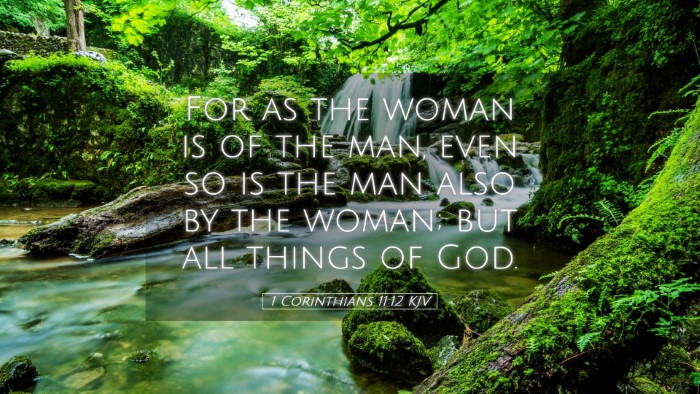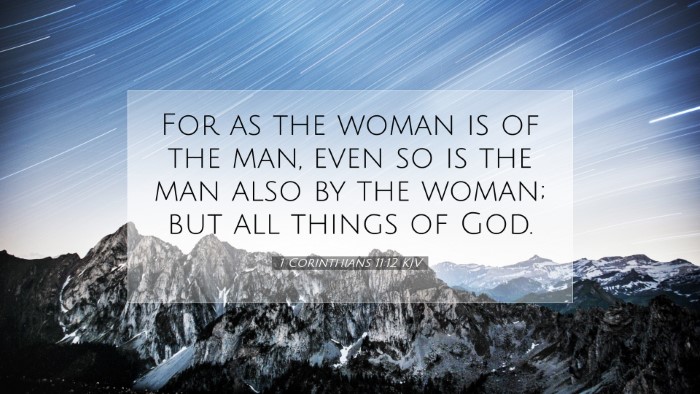Commentary on 1 Corinthians 11:12
Verse: “For as the woman is of the man, even so is the man also by the woman; but all things of God.” (1 Corinthians 11:12)
Introduction
This verse is a crucial part of Paul's discourse on the roles of men and women within the church and their relationships to one another in the context of worship, particularly in the church at Corinth. The Apostle seeks to convey a theological understanding of gender roles that reflects both creation order and divine purpose.
Theological Significance
In this brief yet profound statement, Paul introduces a reciprocal relationship between man and woman, reflecting on the divine order of creation.
1. The Creation Order
Matthew Henry emphasizes the significance of the order in which man and woman were created. He notes that while woman was created from man (Genesis 2:21-22), it does not diminish her value but establishes a structure in which both play essential roles that ultimately glorify God.
2. The Interdependence of Man and Woman
Albert Barnes highlights that Paul’s assertion of man being born of woman reflects the notion of interdependence. Without woman, man cannot exist. This statement encapsulates the idea that, although different in role, men and women complement and need one another, underscoring the unity and equality inherent in their created essence.
3. All Things are of God
Adam Clarke points out that the concluding phrase "but all things of God" offers a vital theological anchor. Paul asserts that the source of creation, both male and female, is God Himself. This divine origin serves both as a reminder of God’s sovereignty and a call to embrace the roles prescribed by Him within the ecclesiastical setting.
Practical Implications for the Church
The implications of this verse extend deeply into church practice and the understanding of gender roles among believers.
1. Encouragement of Mutual Respect
The idea of interdependence encourages mutual respect between genders within the church. As stated by Henry, both men and women should honor one another, recognizing that their contributions are vital to the body of Christ.
2. Emphasizing God’s Authority
Barnes emphasizes that acknowledging God's authority over creation helps frame discussions about roles in the church. The reminder that all comes from God encourages believers to seek His guidance in establishing practices that reflect His character and design.
3. Involvement in Ministry
Clarke also notes that this understanding promotes balanced involvement in ministry, reminding church leaders and congregations that both genders serve distinct yet complementary functions that enhance the communal worship experience.
Conclusion
In summary, 1 Corinthians 11:12 offers profound insights into the nature of gender relations as ordained by God. By understanding the creation order, the mutual dependency of men and women, and the divine origin of all things, pastors, theologians, and students of Scripture can foster an environment in the church that honors God's design. The exhortations found within this verse challenge believers to reflect on their roles and responsibilities, emphasizing the need for unity within diversity as designed by God.


